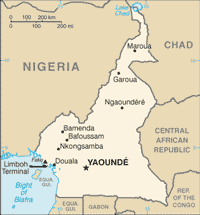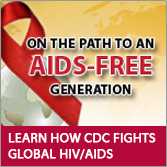Cameroon
HIV/AIDS in Cameroon
- 4.3% Estimated HIV Prevalence (15-49 Years)(2013)
- 44,000 Estimated AIDS Deaths (2013)
- 510,000 Estimated Orphans due to AIDS (2013)
- 117,791 Reported Number of Adults Receiving Antiretroviral Therapy (ART) (2012)
- 49% Estimated ART Coverage per WHO 2010 Guidelines (2012)
SOURCE:
UNAIDS Global Report, 2013, UNAIDS Global Report, 2013

Strategic Focus
Maximizing Unique Government-to-Government Relationships with the Ministry of Health
CDC’s Division of Global HIV/AIDS and the Government of Cameroon began a partnership in 2008 to support the development of sustainable public health capacity and infrastructure. CDC’s role has evolved from solely providing technical leadership to now including direct clinical support and assistance to the Ministry of Health (MOH) to complement the community-level and civil society approach of the U.S. Agency for International Development. CDC helps develop sustainable public health capacity through personnel, infrastructure, systems, and service provision.
Strengthening Public Health Systems
Drawing from extensive experience in building public health systems in the United States, CDC provides technical leadership and direct assistance to the MOH and local non-governmental organizations to strengthen epidemiology, surveillance, laboratory, operations research, HIV prevention, care and treatment programs, and workforce capacity development. CDC-Cameroon’s HIV program strategy focuses on prevention of mother-to-child HIV transmission (PMTCT), bloody safety, lab strengthening, linkages to treatment and care, and strategic information.
Key Activities and Accomplishments
Laboratory Capacity
CDC supported the development of Cameroon’s National Public Health Laboratory and the implementation of a national strategic laboratory plan. CDC launched and implemented the first national proficiency testing program, which currently has 340 laboratories enrolled for HIV testing. Through PEPFAR support, CDC also funded the implementation and roll out of the Strengthening Laboratory Improvement Process Towards Accreditation (SLIPTA) with 14 laboratories currently enrolled in this process. CDC provided technical assistance and laboratory support to set up and build the capacity of two reference laboratories for DNA/RNA polymerase chain reaction testing. These laboratories currently provide early infant diagnosis services to 607 PMTCT sites in four regions, and these labs were able to test and provide results for 6,606 HIV-exposed infants.
Improving Maternal and Child Health
CDC funded the implementation of PMTCT programs in 585 clinics in the Northwest and Southwest regions of Cameroon; these programs expanded to the Centre and Littoral regions in 2014. By end of fiscal year 2013, 83,361 pregnant women were tested for HIV and received their results (13% increase from 2012), and 4,022 HIV-positive women received antiretroviral drugs to reduce the risk of mother-to-child transmission.
Strategic Information
CDC has supported improvement in the national HIV/AIDS monitoring and evaluation (M&E) system and harmonization of M&E registers and data collection tools with close to 25,000 registers printed and distributed nationally. CDC is strengthening Cameroon’s Health Information System through technical and financial support for the customization, piloting, and rollout of District Health Information Software (DHIS) at national, regional, and district levels.
Contact Us:
- Centers for Disease Control and Prevention
1600 Clifton Rd
Atlanta, GA 30333 - 800-CDC-INFO
(800-232-4636)
TTY: (888) 232-6348
24 Hours/Every Day - cdcinfo@cdc.gov
 ShareCompartir
ShareCompartir



